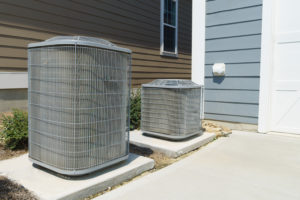“datePublished”: “2020-05-12”
}

This week marked the 50th anniversary of Earth Day, and if this eco-friendly holiday got you thinking about ways YOU can improve the earth, making your HVAC system more efficient is a great place to start! The HVAC experts at Clay’s Climate Control are here with tips to help you accomplish this, so you can get a green — oops, we mean gold — star for having a home that’s more eco-friendly and energy efficient!
Schedule Consistent HVAC Tune-Ups to Enhance Efficiency
Overtime, an HVAC system can get worn down, and when this happens, it becomes less efficient and has to work harder to produce energy. This means that your HVAC equipment is wasting energy, which can impact the environment AND your wallet. Fortunately, scheduling an HVAC tune-up is an easy way to improve this! It’s also important to note that if you haven’t been changing your system’s air filters on a routine basis, you should request an air filter replacement when you schedule your HVAC tune-up appointment.
Install a Programmable Thermostat to Be More Green
Sometimes you need to spend a little green to be more green, and when it comes to investing in a programmable thermostat, you’ll quickly see — and feel — how worth it this is! When your home is equipped with a programmable thermostat, you can set it to your habits, meaning it will automatically change to the temperature you want when you’re home and when you’re not. Investing in this new technology will mean you’ll be wasting less heating and cooling energy, and the environment — and your monthly utility bill — will reap the benefits.
Become More Eco-Friendly By Replacing Your HVAC System
Just as HVAC systems lose their efficiency overtime due to lack of maintenance (IE HVAC tune-ups!), they often hit an age where an HVAC replacement is more beneficial (and eco-friendly!) than HVAC maintenance. If you’re finding that you’re constantly having to bring in an HVAC expert to service your HVAC system, this is the time when you may want to consider an HVAC replacement. By doing this, you’ll save money in the long run. Plus, the HVAC systems these days are typically more efficient than the ones from 15 years ago (which is most likely when yours is from!), so you’ll get a newer, more efficient system, which will be easier on the environment and your bank account.
Inspect Ductwork to Help Make Your Home More Efficient
Whether your ductwork hasn’t been inspected in awhile or it’s getting up there in age, if it’s cracked or damaged in areas, the air that’s being produced will leak through, which will waste energy, increase utility bills and decrease comfort levels in your home. To avoid this, you should have your ductwork inspected as soon as possible. By doing so, you will ensure that your home is not wasting any energy and it is able to achieve a comfortable temperature in every room. If you want to get the most bank for your buck, you may want to opt for a ductless system by Mitsubishi Electric. Not only will this system help you achieve an optimal comfort level in your home, but it will do without breaking the bank.
Earth Day may have come and gone, but now that you have these four tips to make your HVAC system efficient, you’ll be sure to be even more eco-friendly for the next one! If you need help with an air filter replacement, would like to schedule an HVAC tune-up or are interested in setting up an HVAC replacement appointment, the Clay’s Climate Control team is here to help. Contact us today!

